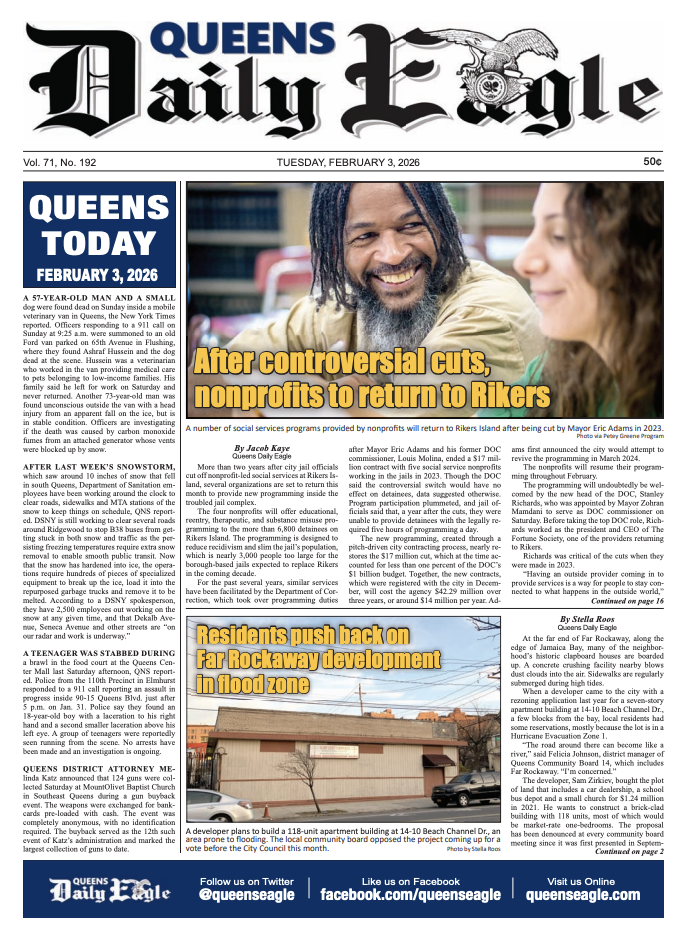Top court reverses Queens murder conviction
/Madeline Singas, a justice on the Court of Appeals, issued a decision reversing a 2016 Queens County Supreme Court, Criminal Term murder conviction. Screenshot via Court of Appeals/YouTube
By Jacob Kaye
The state’s highest court overturned a Queens murder conviction last week, finding that a Queens judge improperly denied a man his right to mount a full defense during his trial.
In a unanimous decision, the Court of Appeals overturned the murder conviction of Dashawn Deverow, who was found guilty of killing 17-year-old Xavier Granville in Far Rockaway in 2012.
The ruling, written by Justice Madeline Singas, says that former Queens Supreme Court Justice Gregory Lasak should have allowed Deverow to present two pieces of potentially exonerating evidence at his trial, both of which could have swayed the jury’s ultimate guilty verdict.
“At trial, the court precluded certain evidence offered by defendant in support of his justification defense,” the ruling reads. “Under the facts presented and upon application of our well-settled law, the effect of the trial judge’s erroneous evidentiary rulings deprived defendant of his constitutional right to present a defense.”
The court’s decision reverses the conviction and orders a new trial.
“We're happy with the court's decision,” Alice Cullina, Deverow’s appeals attorney, told the Eagle.
It’s unclear whether or not the Queens district attorney’s office will retry Deverow – the Queens district attorney’s office declined to comment for this story.
On Dec. 29, 2021, around midnight, about 20 people, some of whom were members of a local gang, were gathered outside in Far Rockaway.
An eyewitness, named in the decision as R.M., said that he saw Deverow and co-defendant Jamane Yarbrough, standing across the street. The eyewitness claimed that Yarbrough pulled out a handgun and fired once at Granville, fatally hitting him in the head.
R.M., the only eyewitness to testify at trial, also claimed that a few minutes later, another round of shots were fired further up the block. He then ran from the scene and claimed he was shot by either Deverow or Yarbrough. He identified both men in a police lineup later in the night.
Though Deverow initially told police that he wasn’t at the scene at the time of the shooting, he later provided a written statement saying he was at the location and fired a gun toward the crowd after they initially began shooting at him.
R.M. told police, and later, a jury, that he had been on the scene because he was walking his girlfriend home in the area when he saw the large crowd.
However, during the trial, Deverow’s attorney attempted to call R.M.’s girlfriend to the stand to testify about her boyfriend’s whereabouts – the defendant claimed that R.M. had not seen his girlfriend, who lived several miles away, that night.
Lasak, who considered the witness’ reason for being at the scene irrelevant, denied the request. In the Court of Appeals decision, Singas said Lasak’s denial “deprived defendant of his constitutional right to present a defense.”
“If [the girlfriend] had testified as defendant indicated she would, her testimony would have directly contradicted a significant portion of R.M.’s account, and undermined R.M.’s testimony regarding how and where he encountered defendant and Yarbrough on Beach 15th Street, immediately before they fired their weapons,” Singas wrote. “Given that R.M. was the sole eyewitness to testify at trial, and the only person claiming that defendant and Yarbrough fired first, [the girlfriend’s] account was not collateral to factual issues to be decided by the jury.”
Deverow was additionally denied a request to play one of several 911 calls made about the shooting.
One woman, the only one who didn’t make their 911 anonymously, told a 911 operator that she had seen the shooters drive off in a beige Jeep Wrangler, adding that there were around four people who fled in the car.
The woman, identified as B.M., testified at the trial and gave contradictory testimony and addressed the discrepancies in her courtroom testimony and 911 call. However, Lasak said that the 911 recording didn’t need to be presented to the jury.
“That certain details of the 911 calls conflict with the People’s evidence and their theory of the case does not render the statements in the calls unreliable,” Singas wrote. “Regardless of whether the call was admissible to impeach B.M., it should have been admitted for the truth of the matter asserted as a present sense impression.”
“Precluding this testimony effectively tied defendant’s hands,” Singas added. “A jury should have been allowed to hear and assess the excluded information and reach a verdict after weighing all the relevant evidence.”
Deverow was originally convicted to 23 years to life in prison by a jury in 2016. The Appellate Division, Second Department, upheld his conviction but reduced his sentence to 17 years to life in prison in February 2020.
Lasak, a former candidate for Queens District Attorney, was first elected to serve as a Queens Supreme Court justice in 2004. He retired in 2018.




